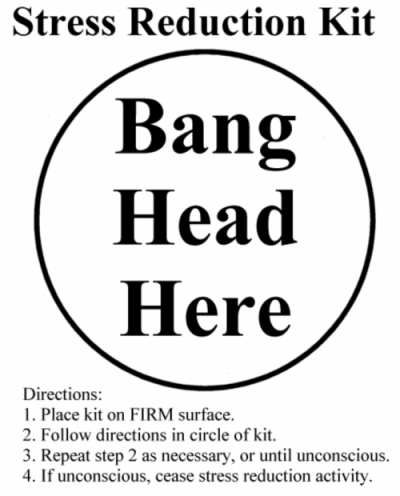Signs of Stress – Do’s and Don’ts
How do you recognize the signs of stress?
We’ve all been there — “I have four exams, a quiz and two homework assignments due this week!” The signs of stress start to appear.
The list of things to study, assignments to complete, and projects/presentations to prepare are always a major conversation topic around Florida Tech. It’s beyond stressful, and that isn’t even including the other things we all have to do, such as applying for scholarships or internships, working to pay bills, preparing for graduate school, or searching for a job after graduation. Most people I know are also involved in at least a couple of school clubs, as well. So how is it even possible to manage all of these things at once? Do you know when you’re too stressed, and what to do about it?
The first thing to know about stress is how to recognize it. Our bodies have all sorts of different ways of reacting to it; an article I found online called “10 Signs of Stress You Probably Ignore (But Shouldn’t)” by Dr. Alice Domar gives it in a nice, concise list:
- Insomnia
- Headaches
- Neck/back pain
- High blood pressure
- Shortness of breath
- Gastrointestinal problems
- Irritability
- Fatigue
- Menstrual irregularities
- Tearfulness

If any of these sound familiar (and there isn’t any other explanation for the symptoms, of course), then you may be more stressed than you realized. Everyone is going to encounter stress in their lives, especially at college; the trick is to recognize when it’s all getting to be too much, and what to do if you find yourself having these symptoms more and more often.
The website helpguide.org has an article on stress management that I found to be quite useful. It first points out some unhealthy ways many people deal with stress, including smoking and/or drinking, taking pills to relax, over- or under-eating, withdrawing from social settings, sleeping too much, procrastinating, and lashing out at others.
Looking back over my college journey, I have definitely been guilty of a number of these, such as when my afternoon “naps” used to stretch for four or five hours or I would go all day without eating. I remember suffering from quite a few migraines my freshmen year, too, which in retrospect, were most likely due to stress.
The article then goes into more healthy ways of handling stress. Everyone has different methods that work for them, but here are a few that have worked for me, followed by some I read about in this article that I will hopefully test out in the future. The biggest one to really help me was integrating exercise into my schedule, which I do via the karate class held here at Florida Tech. I started my sophomore year, and it did wonders for the mysterious migraines that had developed the year before. I haven’t had to worry too much about them since. Karate also helps me focus on something else; everything else in school is extremely academic-based, so punching and kicking things helps take my mind off of school for a bit.

Another one I had to learn early on (in high school, actually) was how to say no. Just like the article says, trying to do too much will just bog you down until you don’t feel like doing anything. I have seen people trying to juggle too many things at once, and they succeed for a while, but eventually they hit their burnout point and suddenly drop everything. You need to figure out what you can deal with, and don’t overdo it.
The last one I’ll mention that I have had success with is learning to forgive others. It wasn’t one I was expecting to read on a list of stress management tips, but it’s nonetheless true. I find it exhausting holding onto grudges and angry feelings. So I taught myself how to let things go by thinking about other things when I fixated too much on something someone else did that bothered me. I know I’ll never be able to control other people’s actions, so why let their behavior ruin my week?
Some tips I found interesting and want to try in my life include trimming my to-do list, reframing the problem, and looking at the big picture. The article recommends splitting a to-do list into “musts” and “shoulds” and arranging them accordingly, even dropping those that aren’t nearly as important. Reframing the problem is another way of saying learning to look at the positive side of things. They use the example of instead of getting upset about getting stuck in traffic, take it as an opportunity to take a breather or listen to some music. Looking at the big picture simply means to ask yourself how much the situation really matters in the long run. If it doesn’t, then it’s time to let it go and move on.
Getting a degree can be super stressful, but when we remember the end-game (a bachelor’s or higher, which will get us those dream jobs we’re all searching for!), it should be worth it. Don’t forget to take some time for yourself, even when it feels like there’s no time. Even a twenty- or thirty-minute break can do wonders for a person’s functionality! No one ever said Florida Tech would be easy, but learning to manage stress will dramatically change your college experience.







Different people have different methods to release. Thanks for sharing your methods. They must be so useful for some peole.